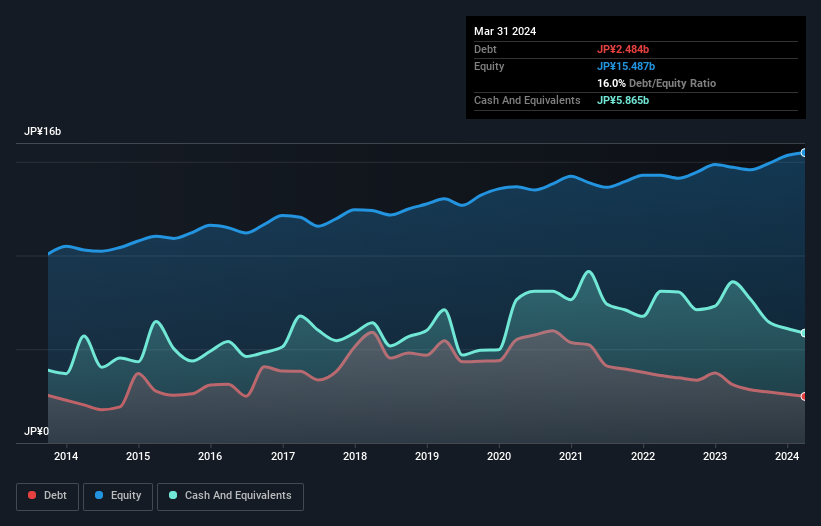- Japan
- /
- Trade Distributors
- /
- TSE:8104
Here's Why KUWAZAWA Holdings (TSE:8104) Can Manage Its Debt Responsibly

The external fund manager backed by Berkshire Hathaway's Charlie Munger, Li Lu, makes no bones about it when he says 'The biggest investment risk is not the volatility of prices, but whether you will suffer a permanent loss of capital.' So it seems the smart money knows that debt - which is usually involved in bankruptcies - is a very important factor, when you assess how risky a company is. As with many other companies KUWAZAWA Holdings Corporation (TSE:8104) makes use of debt. But the real question is whether this debt is making the company risky.
What Risk Does Debt Bring?
Debt and other liabilities become risky for a business when it cannot easily fulfill those obligations, either with free cash flow or by raising capital at an attractive price. Ultimately, if the company can't fulfill its legal obligations to repay debt, shareholders could walk away with nothing. However, a more frequent (but still costly) occurrence is where a company must issue shares at bargain-basement prices, permanently diluting shareholders, just to shore up its balance sheet. Of course, plenty of companies use debt to fund growth, without any negative consequences. When we think about a company's use of debt, we first look at cash and debt together.
Check out our latest analysis for KUWAZAWA Holdings
What Is KUWAZAWA Holdings's Net Debt?
You can click the graphic below for the historical numbers, but it shows that KUWAZAWA Holdings had JP¥2.48b of debt in March 2024, down from JP¥3.11b, one year before. However, its balance sheet shows it holds JP¥5.87b in cash, so it actually has JP¥3.38b net cash.

How Strong Is KUWAZAWA Holdings' Balance Sheet?
We can see from the most recent balance sheet that KUWAZAWA Holdings had liabilities of JP¥23.0b falling due within a year, and liabilities of JP¥3.29b due beyond that. Offsetting these obligations, it had cash of JP¥5.87b as well as receivables valued at JP¥21.7b due within 12 months. So it actually has JP¥1.28b more liquid assets than total liabilities.
This surplus suggests that KUWAZAWA Holdings has a conservative balance sheet, and could probably eliminate its debt without much difficulty. Succinctly put, KUWAZAWA Holdings boasts net cash, so it's fair to say it does not have a heavy debt load!
In addition to that, we're happy to report that KUWAZAWA Holdings has boosted its EBIT by 52%, thus reducing the spectre of future debt repayments. The balance sheet is clearly the area to focus on when you are analysing debt. But it is KUWAZAWA Holdings's earnings that will influence how the balance sheet holds up in the future. So if you're keen to discover more about its earnings, it might be worth checking out this graph of its long term earnings trend.
Finally, a business needs free cash flow to pay off debt; accounting profits just don't cut it. While KUWAZAWA Holdings has net cash on its balance sheet, it's still worth taking a look at its ability to convert earnings before interest and tax (EBIT) to free cash flow, to help us understand how quickly it is building (or eroding) that cash balance. Over the last three years, KUWAZAWA Holdings barely recorded positive free cash flow, in total. While many companies do operate at break-even, we prefer see substantial free cash flow, especially if a it already has dead.
Summing Up
While we empathize with investors who find debt concerning, you should keep in mind that KUWAZAWA Holdings has net cash of JP¥3.38b, as well as more liquid assets than liabilities. And we liked the look of last year's 52% year-on-year EBIT growth. So we don't think KUWAZAWA Holdings's use of debt is risky. There's no doubt that we learn most about debt from the balance sheet. However, not all investment risk resides within the balance sheet - far from it. Case in point: We've spotted 5 warning signs for KUWAZAWA Holdings you should be aware of, and 2 of them make us uncomfortable.
If you're interested in investing in businesses that can grow profits without the burden of debt, then check out this free list of growing businesses that have net cash on the balance sheet.
Valuation is complex, but we're here to simplify it.
Discover if KUWAZAWA Holdings might be undervalued or overvalued with our detailed analysis, featuring fair value estimates, potential risks, dividends, insider trades, and its financial condition.
Access Free AnalysisHave feedback on this article? Concerned about the content? Get in touch with us directly. Alternatively, email editorial-team (at) simplywallst.com.
This article by Simply Wall St is general in nature. We provide commentary based on historical data and analyst forecasts only using an unbiased methodology and our articles are not intended to be financial advice. It does not constitute a recommendation to buy or sell any stock, and does not take account of your objectives, or your financial situation. We aim to bring you long-term focused analysis driven by fundamental data. Note that our analysis may not factor in the latest price-sensitive company announcements or qualitative material. Simply Wall St has no position in any stocks mentioned.
Have feedback on this article? Concerned about the content? Get in touch with us directly. Alternatively, email editorial-team@simplywallst.com
About TSE:8104
KUWAZAWA Holdings
Operates as a construction materials trading company in Japan.
Solid track record with excellent balance sheet and pays a dividend.
Market Insights
Community Narratives



